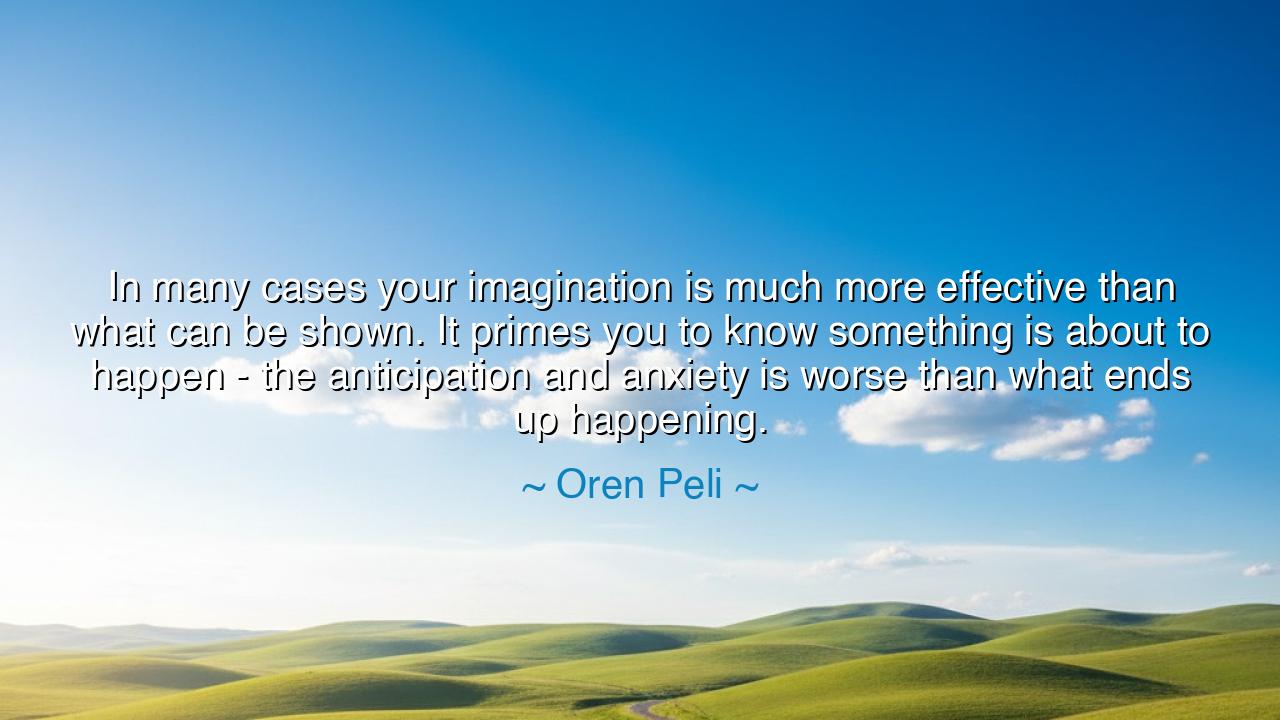
In many cases your imagination is much more effective than what
In many cases your imagination is much more effective than what can be shown. It primes you to know something is about to happen - the anticipation and anxiety is worse than what ends up happening.






“In many cases your imagination is much more effective than what can be shown. It primes you to know something is about to happen — the anticipation and anxiety is worse than what ends up happening.” — thus spoke Oren Peli, the modern craftsman of fear, creator of Paranormal Activity, a tale that transformed simplicity into terror. In this reflection, Peli unveils an eternal truth about the imagination — that the unseen often holds more power than the visible, and that the mind itself is the greatest architect of suspense. Though his words arise from the realm of film and storytelling, they touch upon the ancient nature of human emotion: that fear, expectation, and wonder dwell not in what is revealed, but in what the heart anticipates.
The origin of this insight is found in Peli’s creative process. When he made Paranormal Activity, he worked with almost nothing — no grand effects, no monstrous forms, only the suggestion of presence, the whisper of the unseen. Yet the audience trembled as though facing ghosts themselves. Why? Because he understood the power of the imagination, the unseen painter of terror and awe. In leaving space for the mind to fill, he allowed each viewer’s own fears to become part of the story. Thus, the art of suggestion triumphed over spectacle — the shadow over the light, the silence over the scream.
But this truth reaches far beyond the realm of art. In life itself, our anticipation often torments us more deeply than reality. The mind, restless and creative, magnifies uncertainty into dread. The worry before a great challenge, the sleepless night before confession or battle — these are the moments when imagination becomes a storm, conjuring endless possibilities of failure and pain. Yet when the moment arrives, reality is seldom as terrible as the visions we have summoned. As Peli reminds us, “the anticipation and anxiety is worse than what ends up happening.” The unseen is always larger than the seen; the imagined enemy is always greater than the one who stands before us.
The ancients knew this truth well. The Roman philosopher Seneca wrote, “We suffer more in imagination than in reality.” And the Stoic warriors trained themselves to pierce the fog of their own fears by confronting life as it was, not as it might be. Consider Alexander the Great, who, before crossing the Persian deserts, was told that death and madness awaited him. The men trembled at the stories — of ghosts, of burning sands, of invisible foes. Yet when he marched forward, he found that courage dissolved illusion. The horrors that imagination had built melted beneath the dawn of action. Thus, even in warfare and conquest, the same law holds: it is the mind’s projection, not the world itself, that often binds or frees us.
In the realm of art, this same principle gives birth to greatness. The playwright Shakespeare, too, wielded suggestion as a weapon of wonder. When Macbeth murders Duncan, the act is not shown — it is imagined. The audience feels the deed without witnessing it, for the true power lies not in the sight of blood, but in the tension before the blade strikes. The human imagination fills the void more vividly than any painter or actor could. Peli, centuries later, follows this same sacred craft: to show less is to awaken more, to whisper is to make the soul shout.
Yet Peli’s wisdom is also a mirror for the spirit. It reminds us that our fears, anxieties, and expectations are often creations of our own inner theater. The mind, left unchecked, becomes a storyteller that invents catastrophes. But when we learn to see this pattern, we regain our power. We understand that imagination, though it can enslave, can also liberate. The same force that builds fear can also build hope. The same anticipation that gnaws at us can, when transformed, become the thrill of possibility. To master imagination, then, is to master the emotional world itself.
The lesson of Oren Peli’s words is both ancient and modern: be mindful of what your imagination shows you. When fear rises, look closer — it is often a shadow cast by your own thoughts. When anxiety builds before an unknown future, remember that it is not reality but the anticipation that torments you. In art, in life, and in the quiet depths of the human heart, the unseen always wields greater power than the seen — but it is a power we can shape.
So let this teaching stand: learn to govern your imagination, for it can be both your enemy and your ally. Let it paint not horrors, but courage; not despair, but vision. For as Oren Peli and the sages before him have shown, the mind is the first and greatest storyteller — and whether it writes tragedy or triumph is a matter of what we choose to imagine.






AAdministratorAdministrator
Welcome, honored guests. Please leave a comment, we will respond soon